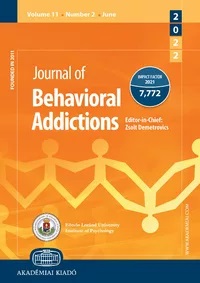Gambling along the schizotypal spectrum: The associations between schizotypal personality, gambling-related cognitions, luck, and problem gambling
Gambling along the schizotypal spectrum: The associations between schizotypal personality, gambling-related cognitions, luck, and problem gambling
Author(s): Gabriel A. Brooks, Luke ClarkSubject(s): Behaviorism
Published by: Akadémiai Kiadó
Keywords: schizotypal personality; schizotypy; gambling; gambling-related cognitive distortion; gambling beliefs; luck
Summary/Abstract: Objective. Schizotypal personality (schizotypy) is a cluster of traits in the general population, including alterations in belief formation that may underpin delusional thinking. The psychological processes described by schizotypy could also fuel cognitive distortions in the context of gambling. This study sought to characterize the relationships between schizotypy, gambling-related cognitive distortions, and levels of problem gambling. Methods. Analyses were conducted on three groups, a student sample (n = 104) with minimal self-reported gambling involvement, a crowdsourced sample of regular gamblers (via MTurk; n = 277), and an additional crowdsourced sample with a range of gambling involvement (via MTurk; n = 144). Primary measures included the Schizotypal Personality Questionnaire – Brief (SPQ-B), the Peters et al. Delusions Inventory (PDI-21), the Gambling Related Cognitions Scale (GRCS), and the Problem Gambling Severity Index (PGSI). Luck was measured with either the Belief in Good Luck Scale (BIGLS) or the Beliefs Around Luck Scale (BALS). Results. Small-to-moderate associations were detected between the components of schizotypy, including delusion proneness, and the gambling-related variables. Schizotypy was associated with the general belief in luck and bad luck, but not beliefs in good luck. A series of partial correlations demonstrated that when the GRCS was controlled for, the relationship between schizotypy and problem gambling was attenuated. Conclusions. This study demonstrates that schizotypy is a small-to-moderate correlate of erroneous gambling beliefs and PG. These data help characterize clinical comorbidities between the schizotypal spectrum and problem gambling, and point to shared biases relating to belief formation and decision-making under chance.
Journal: Journal of Behavioral Addictions
- Issue Year: 11/2022
- Issue No: 2
- Page Range: 406-416
- Page Count: 11
- Language: English

